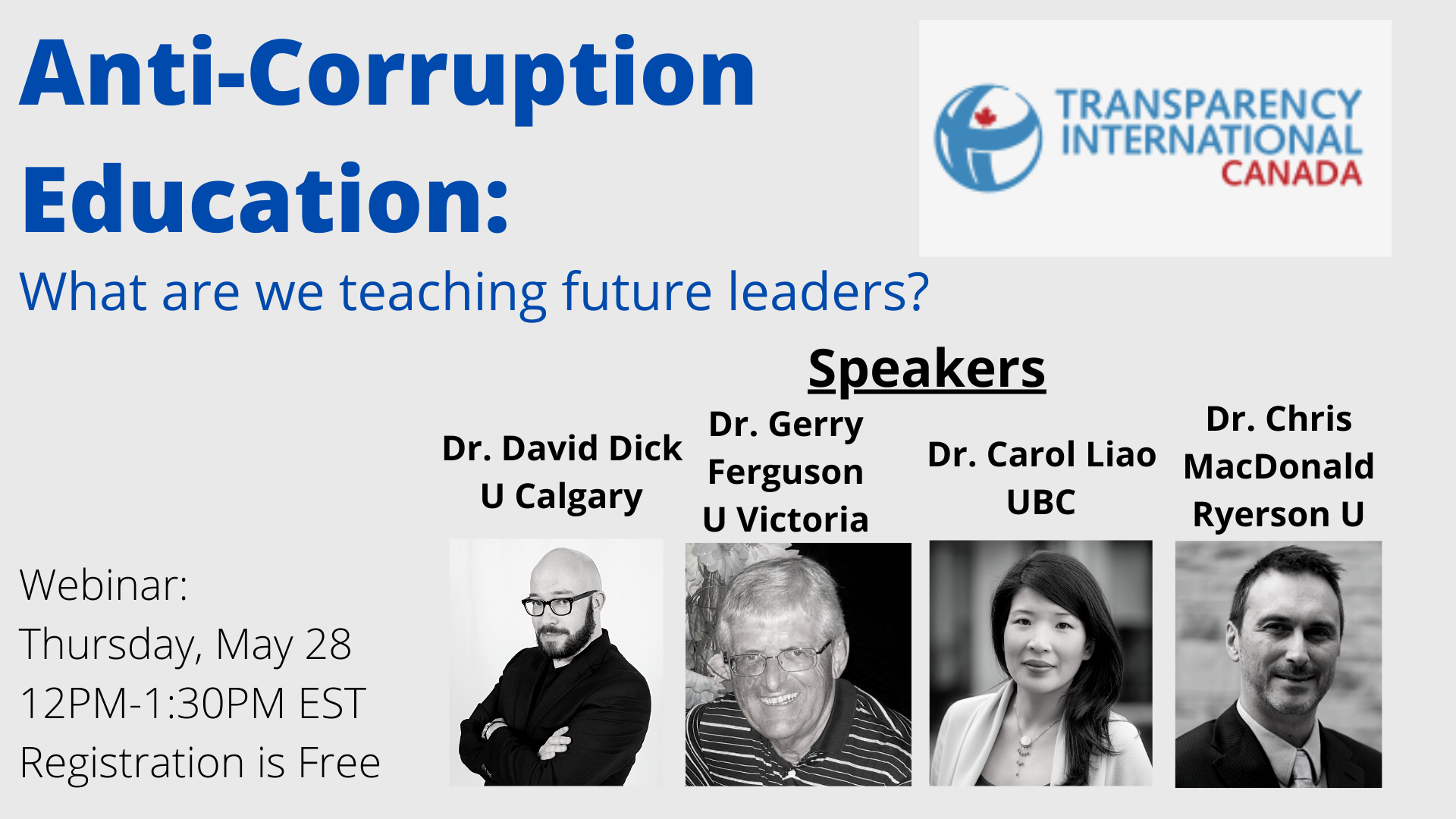It's often said that Millennials and Generation Z that are entering the work force from higher education are seeking employers with ethics and purpose, in addition to a good pay cheque and steady employment. But what are our universities doing to prepare students to engage and eventually mold the workplaces they will enter? Do new employees know what to do if they are asked to commit an act of corruption?
In this webinar, an expert panel from Canadian academia will discuss what they are doing at their schools to prepare their students by discussing:
- What their departments offer in anti-corruption, ethics, and accountability education;
- What is the response from students?
- What is the response from recruiters?
- How can we build on these kinds of programs?
SPACE IS LIMITED
Register here: https://us02web.zoom.us/webinar/register/WN_L43TM5eOSfmncaGbgKPVIw
SPEAKER BIOS
Dr. David Dick
David G. Dick is an Associate Professor of Philosophy and a Fellow in CCAL at the Haskayne School of Business at the University of Calgary.He teaches on ethics, political philosophy, and the philosophy of money and is the author of papers on the ethics of markets, the limits of property, and the powers of money.In the Calgary business community, he oversees the Integrity Network, a working group of ethics professionals from corporate, academic, and non-profit sectors that meets four times a year to discuss and engage business ethics issues.Dr. Dick has won a total of five teaching awards in his career, and in 2017, he was named one of Avenue Magazine’s Top 40 Under 40.
Dr. Gerry Ferguson
Gerry Ferguson is a University of Victoria Distinguished Professor of Law who specializes in criminal law. He is also a senior associate with the International Centre for Criminal Law Reform and Criminal Justice Policy in Vancouver. Professor Ferguson is a member of the United Nations Office on Drugs and Crime Anti-Corruption Academic Development Initiative (ACAD) devoted to the creation of anti-corruption academic materials and the teaching of university courses on global corruption. He is the author of Global Corruption: Law, Theory & Practice (2018) available free of charge at https://icclr.org/publications/global-corruption-law-theory-and-practice/. He is the co-author, with Justice Dambrot, of the annually updated two-volume book, Canadian Criminal Jury Instructions and co-author of the Annual Review of Criminal Law. He has given guest lectures at various law schools in South Africa, China, Vietnam, Thailand, Singapore, Australia, New Zealand, Ireland and Europe. Professor Ferguson is a former member of the National Advisory Council of the Law Commission of Canada.
Dr. Carol Liao
Dr. Carol Liao is an Assistant Professor at the UBC Allard School of Law and the Director of the Centre for Business Law, a national research centre overseeing two experiential learning programs at Allard Law. She is also the UBC Sauder Distinguished Scholar of the Peter P. Dhillon Centre for Business Ethics, UBC Sauder School of Business. Carol is a past Bertram Scholar of the Institute of Corporate Directors and prior to academia was a senior associate in the New York Mergers and Acquisitions Group of Shearman & Sterling LLP, a global law firm. Her research focuses on business law, corporate governance, corporate sustainability, and business ethics. She is the principal investigator of a SSHRC Insight Grant-funded project studying the evolution of Canadian corporate law and governance principles from an economic, social, and environmental sustainability lens, and a Climate Governance Expert of the Canada Climate Law Initiative. She is a frequent media commentator on governance issues and has been interviewed by outlets such as Bloomberg News, CBC Radio One, CBC on the Coast with Gloria Macarenko, The Globe and Mail Report on Business, Financial Post, The Star, The Tyee, BC Business, Director Lens, and Business in Vancouver Magazine.
Dr. Chris MacDonald
Chris MacDonald teaches ethics and critical thinking at the Ted Rogers School of Management, Ryerson University, Toronto. He is director of the Ted Rogers Leadership Centre. A philosopher by training, he writes and speaks on issues of business ethics, governance, and corporate responsibility.





